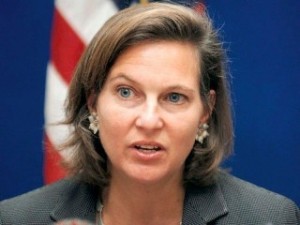This piece was reprinted by OpEd News with permission or license. It may not be reproduced in any form without permission or license from the source.
Cross-posted from Consortium News

Washington's role in the coup d'etat in Kiev on Feb. 22 has brought the U.S. a Pyrrhic victory, with the West claiming control of Ukraine albeit with a shaky grip that still requires the crushing of anti-coup rebels in the east. But the high-fiving may be short-lived once the full consequences of the putsch become clear.
What has made the "victory" so hollow is that the U.S.-backed ouster of elected President Viktor Yanukovych presented Russia's leaders with what they saw as a last-straw-type deceit by the U.S. and its craven satellites in the European Union. Moscow has responded by making a major pivot East to enhance its informal alliance with China and thus strengthen the economic and strategic positions of both countries as a counterweight to Washington and Brussels.
The agreement, along with closer geopolitical cooperation between Beijing and Moscow, is of immense significance and reflects a judgment on the part of Russian leaders that the West's behavior over the past two decades has forced the unavoidable conclusion that -- for whatever reason -- U.S. and European leaders cannot be trusted. Rather, they can be expected to press for strategic advantage through "regime change" and other "dark-side" tactics even in areas where Russia holds the high cards.
This Russian-Chinese rapprochement has been a gradual, cautious process -- somewhat akin to porcupines mating, given the tense and sometimes hostile relations between the two neighbors dating back centuries and flaring up again when the two were rival communist powers.
Yet, overcoming that very bitter past, Russian President Putin -- a decade ago -- finalized an important agreement on very delicate border issues. He also signed an agreement on future joint development of Russian energy reserves. In October 2004, during a visit to Beijing, Putin claimed that relations between the two countries had reached "unparalleled heights."
But talk is cheap -- and progress toward a final energy agreement was intermittent until the Ukraine crisis. When Russia supported Crimea's post-coup referendum to leave Ukraine and rejoin Russia, the West responded with threats of "sectoral sanctions" against Russia's economy, thus injecting new urgency for Moscow to complete the energy agreement with China. The $400 billion gas deal -- the culmination of 10-plus years of work -- now has provided powerful substantiation to the Russia-China relationship.
Indeed, you could trace the evolution of this historic detente back to other Western provocations and broken promises. Six months before his 2004 visit to China, Putin watched NATO fold under its wings Bulgaria, Estonia, Latvia Lithuania, Romania, Slovakia and Slovenia. Five years before that, Poland, Hungary, and the Czech Republic had become NATO members.
A Major Missed Opportunity
Not only were these Western encroachments toward Russia's border alarming to Moscow but the moves also represented a breach of trust. Several months before the fall of the Berlin Wall in November 1989, President George H. W. Bush had appealed for "a Europe whole and free." And, in February 1990, his Secretary of State James Baker promised Soviet President Mikhail Gorbachev that NATO would move "not one inch" to the East, if Russia pulled its 24 divisions out of East Germany.
Yet, a triumphant Washington soon spurned this historic opportunity to achieve a broader peace. Instead, U.S. officials took advantage of the Soviet bloc's implosion in Eastern Europe and later the collapse of the Soviet Union itself. As for that "Europe whole and free" business, it was as if the EU and NATO had put up signs: "Russians Need Not Apply." Then, exploiting Moscow's disarray and weakness, President Bill Clinton reneged on Baker's NATO promise by pushing the military alliance eastward.
Small wonder that Putin and his associates were prospecting for powerful new friends 10 years ago -- first and foremost, China. And, the West kept providing the Kremlin with new incentives as NATO recruiters remained aggressive. NATO heads of state, meeting in Bucharest in April 2008, declared: "NATO welcomes Ukraine's and Georgia's Euro-Atlantic aspirations for membership in NATO. We agreed today that these countries will become members of NATO."
That led to some very foolish adventurism on the part of former Georgian President Mikheil Saakashvili, who had been listening to the wrong people in Washington and thought he could play tough with the rebellious regions of Abkhazia and South Ossetia, including attacks on Russian peacekeeping troops. Russian forces gave the Georgians what Moscow normally calls a "resolute rebuff."
The 2008 declaration of NATO's intent is still on the books, however. And recent events in Ukraine, as a violent putsch overthrew elected President Yanukovych and installed a pro-Western regime in Kiev, became the proverbial straw that broke the camel's back.
During an interview with CNBC on May 23, 2014, President Putin bemoaned the still-pending NATO expansion in the context of Ukraine:
"Coup d'etat takes place, they refuse to talk to us. So we think the next step Ukraine is going to take, it's going to become a NATO member. They've refused to engage in any dialogue. We're saying military, NATO military infrastructure is approaching our borders; they say not to worry, it has nothing to do with you. But tomorrow Ukraine might become a NATO member, and the day after tomorrow missile defense units of NATO could be deployed in this country."
Putin raised the issue again on May 24, accusing the West of ignoring Russia's interests -- in particular, by leaving open the possibility that Ukraine could one day join NATO. "Where is the guarantee that, after the forceful change of power, Ukraine will not tomorrow end up in NATO?" Putin wanted to know.
Forward-Deployed Missile Defense
(Note: You can view every article as one long page if you sign up as an Advocate Member, or higher).





